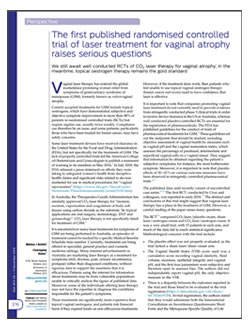Update on vaginal laser therapy
9 November 2018:

Earlier this week, Professor Chris Maher a urogynaecologist from the University of Queensland and Dr Melissa Buttini, a gynaecologist at the Wesley Hospital in Brisbane raised some serious questions about vaginal laser treatment of genitourinary syndrome of the menopause (GSM).
The Therapeutics Goods Administration (TGA) approved CO2 laser therapy for a number of body soft tissues, however was not listed specifically for treatment of GSM. There is no Medicare Benefits Schedule item number for CO2 laser therapy and so the extent of its use cannot be measured. We do know however that advertisements for CO2 laser therapy treatment for symptoms of GSM are extensive.
In July this year, the Food and Drug Administration (FDA) in the US issued a warning about the use of CO2 laser therapy for ‘vaginal rejuvenation’ and stated “These products have serious risks and don’t have adequate evidence to support their use for these purposes. We are deeply concerned women are being harmed.”
AMS President Clinical Associate Professor Amanda Vincent was interviewed for the Australian Doctor in response to the MJA article and noted “There are safety concerns and significant costs involved - the recommendation is for 3 treatments in a 12-month period with each treatment costing $500-$1000.”
Maher and Buttini question the abstract and conclusion of the first randomised control trial undertaken by Cruz et al reported in January this year. While Cruz et al suggest that vaginal laser therapy has a place in the treatment of GSM, further investigation of the methods and results paint a different story. Patients in the vaginal oestrogen intervention reported better outcomes compared with patients in the laser/sham cream arm who reported a significant worsening of pain.
In MJA InSight, Maher warns “What really causes some anxiety for me is we have been through all this within the past 10 years with transvaginal meshes, we’re still going through it.” Clearly further evidence is required from rigorous clinical trials before we can recommend vaginal laser as a therapy for GSM. In the interim, vaginal/topical oestrogen is the gold standard treatment for GSM as it is safe and efficacious. The only group of women who can’t use that are those with breast cancer or breast cancer survivors.
The AMS looks forward to hearing the results of a double-blinded, randomised, placebo-controlled trial of the efficacy of the MonaLisa Touch procedure for the treatment of postmenopausal vulvovaginal symptoms being undertaken by Professor Jason Abbott at the Royal Hospital for Women in Randwick.
